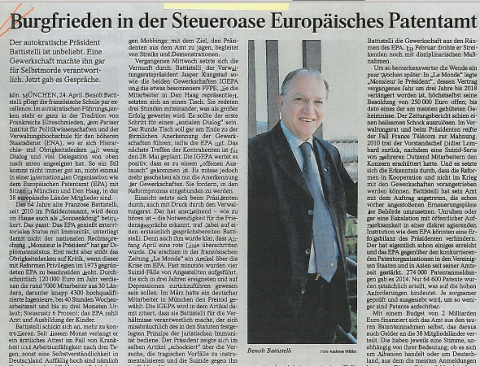05.25.15
Posted in Europe, Patents at 7:53 pm by Dr. Roy Schestowitz

Summary: German media gives the impression that there is peace and harmony now that Benoît Battistelli and his circle of power speaks to staff, but nothing is said about simultaneous (albeit covert) attacks against that staff
NOW THAT the EPO hires private spies (waste of money) to intimidate its own staff it wants us to believe that it approaches reconciliation. That’s an insulting illusion. As Merpel put it the other day, “SUEPO, the Staff Union of the EPO, has announced (see news item of 21 May) that it understands that Control Risks (who describe themselves as “an independent, global risk consultancy specialising in helping organisations manage political, integrity and security risks in complex and hostile environments”) has been commissioned by the EPO to investigate staff members who are elected representatives of the Staff Committee and/or Staff Union. Merpel considers that this completely undermines any attempt at social dialogue, or moves towards union recognition. How are EPO employees to be expected to serve on the Central Staff Committee, or to represent the EPO unions, if at the same time they are to be harassed and investigated, apparently for performing this very service?”
Also, “in the meantime,” she wrote, “most of the reforms to which the EPO staff objected were being pushed through, and it began to appear as though, even if union recognition was achieved, it would be too late to achieve any of the modifications that were needed to the reforms.”
What kind of reform and negotiation is this? Benefit of the doubt given to Benoît Battistelli? Why? Control freak is what he is and there is hardly an effort to deny it, either. Is this going to be the legacy of the European Union? Autocrats who waste taxpayers’ money?
Around the same time of a report from the Frankfurter Allgemeine Zeitung there was this Süddeutsche Zeitung article from a month ago [PDF]. It said “Talking Helps”, but helps who? So far it has mostly gagged EPO critics.
Here is the article in full:
Talking Helps
For months a massive dispute has been brewing at the European Patent Office. The staff regard their basic rights as being eroded by the President. Now the opposing camps have met for the first time.
Top executives at the Patent Office are starting to worry about its reputation – and the ability to do its job
By Katja Riedel
This week something almost impossible happened at the European Patent Office – or at least that’s the way it looked to the always well-informed bloggers on IPKat. This and similar Internet forums are where the people get together who are interested in intellectual property. And over the past few months the patent scene worldwide has been watching Munich with as much excitement as concern, and the darkened windows of the headquarters of the European Patent Office (EPO) on the bank of the River Isar. It is there, for all to see, that a dispute which is as bizarre as it is bitter has been brewing between parts of the staff, supported by the union Suepo, and the President, Benoît Battistelli.
This week something has happened which even Battistelli’s most trusted lieutenants would hardly have thought feasible: It seems that a rapprochement is at least on the cards. On Wednesday the President, along with high ranking delegates from his supervisory body, the Administrative Council, met with union representatives. The Danish Chairman of the Administrative Council, Jesper Kongstad, was there, together with the German and Croatian EPO Vice-Presidents, and representatives from the unions Suepo and FFPE. The aim was to re-establish social harmony, on the Isar and in the entire international organization, with its well on 7000 staff members. This is regarded as having absolute priority for the entire organization, according to the Administrative Council.
What sounds like something obvious has up now been unthinkable. The unions and the President weren’t even getting close – they were worlds apart. Step by step, Battistelli has been implementing a major programme of reform. He wants to streamline the Office, which is actually said to be the most expensive in the world, and that means doing away with some of the perks. For example, he has changed the promotion system to a more rigid performance-related points system. Staff at the European Patent Office actually earn an average of 7600 Euro, their income is not subject to tax, their children attend an international school free of charge, and there are a lot of other benefits as well. But they are also highly specialized scientists. And they emphasize that the issue is not one of money, but of basic rights, which in the world of the EPO, with its own set of rules, do not apply, but under German labour law and that of most of the 38 individual states which are represented at the EPO are a matter of course. The right to unionize, for example. Or, if someone falls ill, not having to have an unannounced visit from a company doctor at their home. A court at The Hague, one of the EPO locations, even recently ruled that the Office was infringing basic human rights. This is a criticism which Battistelli has rejected in a public bulletin: “There is a strange rumour going around in Europe, in media, political circles, and even at national courts: That we infringe basic rights. What an accusation!”
For a long time the representative of the Member States have let the President have a free hand, among other reasons because at its heart they were in favour of the reform. The Office is preparing for the introduction of the European Unitary Patent, which will make Munich one of the most important places in the world when it comes to intellectual property. It will also be the seat of an outpost of the European Patent Court, which will decide on the fate of billions of Euros. Top ranking EPO representatives have recently become extremely concerned that the tumult surrounding Battistelli is damaging the reputation of the Office, and is taking up too much of the effort which is needed for bringing about the reforms at the EPO. And even the patent examiners, highly specialized scientists, are saying that they are concerned – about the quality of the patents. In future, more patents will have to be given the once-over, less critically, so as to be able to hold their own in worldwide competition with glittering statistics and high earnings from fees.
At the most recent meeting of the Administrative Council at the end of March, Battistelli’s back-covering finally gave way, even on the part of the German delegation. The inner circle closeted itself with Battistelli, and made it penetratingly clear to him that he needed to give up the confrontation approach, and take a step in the direction of the staff, in the interests of his own reform programme, which he is aiming to complete by the end of his term of office in 2018.
For four hours they sat together on Wednesday, and word had it afterwards from the people concerned that there were no harsh words or emotional outbursts at all. And that says a lot,
after a year with 22 days of strikes, with demonstrations at consulates on the one hand and threats of disciplinary procedures and measures against personnel who were too loud in their criticism on the other. A working group has been set up. The top-ranking gathering will reconvene at the end of May. “It wasn’t an easy meeting, but actually sitting at the same table was an important first step, and the beginning of a constructive process”, said the Chairman of the Administrative Council Kongstad, in a joint communiqué with Battistelli. The President too praised the open atmosphere. Suepo did express regret that the question of a fixed role of the unions in the EPO regulatory procedure appeared to be the sole specific point of negotiation. There was the feeling, however, that the delegates from the Administrative Council had at least understood the views of the employees. Caption:
Strike: In the past few months, the staff have repeatedly been making their voices heard at the consulates of the Member States in Munich
The EPO’s management is no negotiations partner until or unless it stops intimidating the staff of the EPO. This ought to be clear to anyone who has watched what Battistelli has done over the past couple of years. █
“The European Patent Office is a Corrupt, Malicious Organisation Which Should Not Exist”
–Richard Stallman
Permalink
 Send this to a friend
Send this to a friend
Posted in Bill Gates, Microsoft, Patents at 9:29 am by Dr. Roy Schestowitz

Monarchs funded by industry
Summary: A reminder of where we stand on the issue of patent ‘reform’ in the US and who is controlling or shaping it
REMEMBER when Nokia was giving patents to Android-hostile trolls like MOSAID (with Microsoft’s confirmed involvement in the transaction)? Well, Florian Müller (funded by Microsoft) entirely omits Microsoft’s role. Some trolls are serving the agenda of much larger companies (they act as proxies), so clearly enough (to a prudent observer), it’s not only trolls who are the problem. It’s an institutional problem.
Nevertheless, the PATENT Act which we wrote about before is still hailed by legal and corporate media as the solution, despite its inability to deal with or tackle big trolls (like Microsoft). Some GOP-leaning sites even protect the small trolls (see “Small inventors step up fight to block patent overhaul law”) although it’s correctly stated that the “legislation only helps big companies”.
They are now trying the “startup” angle to shoot down the PATENT Act and its sibling, the Innovation Act. One article from David Pridham (posted also in The Hill) says: “The proposed Innovation Act (HR 9) is supposed to target only patent trolls. But as the National Venture Capital Association and 144 major universities warn, the bill’s poorly drafted provisions actually will undermine the startups and small businesses responsible for nearly all breakthrough innovation and job growth in the United States.”
“It is not true that startups would be hurt, unless they built their business on a house of cards (or patent applications).”It’s true that these changes “target only patent trolls.” It is not true that startups would be hurt, unless they built their business on a house of cards (or patent applications).
lawyers from IAM used the same kind of angle to discredit any reform, claiming that the system is “stacked [...] against the small inventor” (or stacked in favour of large corporation).
See the article “A devastating blow to Wisconsin’s innovators”. It’s that same talking point again.
“Most notably,” it says, “the law will install extensive new documentation requirements for patent lawsuits. Lawmakers want to increase the burden of bringing a case to court in order to discourage frivolous suits. But the law won’t only raise the difficulty of filing an unfounded suit, it also will make it harder for legitimate patent holders to protect their intellectual property in court. Inventors will be required to file hundreds of pages of technical paperwork just to start a lawsuit.”
“It was reported some years ago that Gates and his mate Nathan Myhrvold (the world’s biggest patent troll) had both been lobbying the government regarding patent law.”That’s just overrated. Small companies (except trolls) cannot use patents against large companies because they simply don’t have enough patents; they can be sued in retaliation by the large companies. When we saw the words “Partying for Innovation” in this new press release about “Happy Patent Day” we were reminder of this old myth that patents are supposed to help the “small guy” or the “poor inventor”. It ought to be evident by now that the real goal of today’s patents (and the law which accompanies them) is to protect large corporations, including those which use trolls as their assault drones/attack dogs. Why is law being tilted so profoundly in favour of large corporations? Look no further than prominent politicians like the Clintons. As Timothy B. Lee showed the other day, “Both sides of the patent reform debate have been showering Hillary Clinton with cash” (because they can afford to bribe politicians).
“On Friday night,” wrote Lee, “Hillary Clinton revealed the names of the various companies and trade groups that have collectively given her millions of dollars in speaking fees since the beginning of 2014. Looking through the list, one thing that stood out to me was how many of the payments came from companies with a strong interest in the patent reform debate.”
The corrupt patent system is a result of a corruptible political system. It’s not pleasant to hear, but anyone still believing that arguments will be judged based on merit rather than based on payments is clearly not paying attention. Bill Gates himself is exceptionally close to the Clintons — to the extent of having staff intersections at the highest of levels. Profits are paramount, no matter the means. A book about Microsoft’s genesis (Barbarians Led by Bill Gates, a book composed by the daughter of Microsoft’s PR mogul) explained that Bill Gates “had told Eller on a number of occasions that he longed to do a deal with the Russians because they were well educated and their labor was cheap.” That was before Gates lobbied the government (where he has enormous influence/control) for cheaper labour to come from abroad. It was reported some years ago that Gates and his mate Nathan Myhrvold (the world’s biggest patent troll) had both been lobbying the government regarding patent law. Millions were spent. Gates himself makes a huge fortune out of patents. It’s not speculation but a fact we habitually cover.
“It’s much ‘safer’ to blame the “trolls”, using them as a scapegoat that distracts patent debates from much bigger culprits.”Plutocrats’ control of politics is key here and as the plutocrats’ paper, Forbes (regular glorifier of Gates), told us the other day: “Of great concern is the issue of patent trolls. Every year, companies that don’t actually make or sell any products bring frivolous lawsuits against companies ranging from Google and Pfizer to the smallest of startups—alleging patent infringement. Despite the fact that these cases are nearly always dismissed when the patent holders fight back, defending against them can be prohibitively expensive. And as a result, they also distract from innovation.”
Actually, of even greater concern are large corporations and the plutocrats who run them, but don’t expect Forbes to speak negatively about them. Corporate media doesn’t view itself as ‘authorised’ to do that. It’s much ‘safer’ to blame the “trolls”, using them as a scapegoat that distracts patent debates from much bigger culprits. █
Permalink
 Send this to a friend
Send this to a friend
Posted in Deception, Free/Libre Software, Microsoft at 8:38 am by Dr. Roy Schestowitz

Summary: OpenStack, which celebrates rapid growth in this month’s event in Canada, is facing a proprietarisation threat from Microsoft
FOR A NUMBER of years now Microsoft has been trying to subvert OpenStack, making it proprietary and Windows-leaning. It never quite succeeded, but with help from Canonical and Cloudbase Microsoft is getting closer. To quote this report, “Canonical has just announced a new partnership with Cloudbase Solutions, a company that develops Windows components in OpenStack, which will allow customers to run KVM and Hyper-V environments side by side in the same cloud.”
“When Microsoft releases something as “Open Source” it is merely marketing or an intrusion attempt.”OpenStack is Apache-licensed, Python-based, and it generally strives to integrate only free components. Why would it allow Microsoft anywhere near it? Hyper-V is proprietary, it requires Windows (with back doors), and it has no place in an “open” stack like OpenStack.
Microsoft has nothing at all to do with Free/Open Source software (FOSS). Microsoft is attacking FOSS. When Microsoft releases something as “Open Source” it is merely marketing or an intrusion attempt. Earlier this month, as we noted last week, Microsoft released some useless code as “Open Source” (to misleadingly associate Windows with "Open Source") and Microsoft apologists like Paul Krill covered it at the time, noting that “Analysts see Windows Communication Foundation as a last-generation technology, which limits its usefulness” (as usual).
Remember when Microsoft was throwing some DOS code (not as Open Source) out there to create a publicity party/PR stunt? That was one year ago. █
Permalink
 Send this to a friend
Send this to a friend
Posted in Microsoft at 8:05 am by Dr. Roy Schestowitz
Viewing itself as above the law

Summary: British media covers Microsoft’s abuse in the UK, but there are many similar incidents, and not just in the UK
GIVEN Microsoft’s pattern of retribution against individuals and organisations, what was revealed in UK-based media (and Bloomberg in the US) some days ago was hardly surprising.
A reader of ours reminded us of this older report about “Rohan Silva, who was a senior advisor to David Cameron on digital policy from May 2010 to June 2013, and a former economic advisor to George Osborne” because he “revealed the threats made by Microsoft during a speech at an event in London.”
In his own words: “A day or two before we were going to give the speech, a couple of backbench MPs called the office – they said Microsoft had called them saying if we went ahead with the speech on open standards, open architecture and open source, they would cut spending or maybe close research and development centres in the constituencies of the MPs they had called.”
“Microsoft is bamboozling politicians using corruptible media, not just through lobbyists who issue threats.”This is what he told delegates at the Chief Digital Officer Summit, so Microsoft’s bullying against British politicians is not exactly new. It sounds similar to the story told by Steve Hilton. There is a pattern here. We now see over a dozen news sites covering the Microsoft-led assault on British politicians [1, 2, 3, 4, 5, 6, 7, 8]. The British public will see the real face of Microsoft, but the public should not assume that this is an isolated incident involving some ‘rotten apples’. It’s not done only in Britain, either (here are examples from the US [1, 2]). This is how Microsoft does ‘business’, and not just in the UK. Softpedia, a Romanian site, spoke about Microsoft “Blackmailing UK Officials” and Robert Pogson, a Canadian, said we should “Put The Job-cuts Where They Belong, In Redmond”. Microsoft “used to bully key people everywhere to give their software the inside track in IT-decisions,” he wrote, referring to a phenomenon we often cover here: entryism, moles, revolving doors, etc. Microsoft plays dirty. There is a factual basis for disdain of Microsoft.
Microsoft is bamboozling politicians using corruptible media, not just through lobbyists who issue threats. Its boosters (in ‘news’ sites) attack the competition. We have named and shamed many of those who are/were actively involved in it. Sometimes Microsoft even hires people from the media in order to manipulate the media. Recall media mole Peter Galli, who repeatedly attacked ODF in the media until Microsoft hired him. He has since then been promoted at Microsoft to “Director of Executive Communications at Microsoft International”. So, from Microsoft promotion in the media (he used to be fake ‘journalist’ whose main goal was to promote Microsoft agenda) Peter Galli moved on to corrupting the press on behalf of Microsoft, as per his job title.
Again, this is just how Microsoft does ‘business’. It’s a deeply corrupt company and it keeps reminding us of that. █
Permalink
 Send this to a friend
Send this to a friend
Posted in Europe, Patents at 4:46 am by Dr. Roy Schestowitz

Summary: German press article from April 2015 (with translations)
WHILE the EPO hires spies to attack journalists (not just staff), this one article (see these translations [PDF]) frames Battistelli as a peacemaker, which is wrong:
Truce at the Tax Haven of the European Patent Office
The autocratic President, Battistelli, is not a popular person. One union is even holding him responsible for suicides. Now discussions are under way.
kön. MUNICH, 24 April. Benoît Battistelli represents the French School par excellence. His autocratic management style is entirely in the tradition of the cradle of France’s elite, the Paris Institute of Political Science and School of Management for Executive State Service (ENA), where he embraced hierarchical and authoritarian thinking, with little dialogue and a lot of top-down delegation. A style like that does not always sit well, and even less so in an international organization such as the European Patent Office (EPO), with headquarters in Munich and The Hague, and with 38 European countries as members.
Battistelli, a 64-year-old Frenchman, being in office since 2010, has been dubbed the “Sun King” within the Office. The title fits: The EPO enjoys extra-territorial status with immunity, and is therefore not subject to national legislation. “Monsieur le Président” even has diplomatic status. But this authoritarian approach runs into trouble if it threatens to bring in reforms that erode privileges at the EPO, founded in 1973. The 7000 or so staff, from 30 countries, earn an average of 120,000 Euro a year, among them some 4300 highly qualified engineers, for a 40-hour working week and up to three months of holidays, a tax rate of 6 percent, and the EPO paying for medical care and children’s education.
Battistelli is out to exert more control. As of this month, he is demanding a doctor’s certificate in the event of illness and inability to work after three days, something which otherwise goes without saying in Germany. Illness numbers and time off are noticeably high. Since the start of the year, new criteria apply for assessing the performance of the staff. In this context, trouble has been brewing for more thanyear between the union SUEPO and the President, who does not recognize them as discussion partners. This has resulted in an attack on Battistelli, accusing him of joint responsibility in the suicide of staff members, among other reasons due to mobbing tactics. The aim is to drive the President from office, accompanied by strikes and demonstrations.
Last Wednesday, the reasonable approach won through. Battistelli, the Chairman of the Administrative Council Jesper Kongstad, and the two unions SUEPO and the somewhat more moderate FFPE, which represents the staff at The Hague, sat down at the same table. They talked for three hours, which is regarded as a great success. It is seen as the first step towards a “social dialogue”. According to the EPO, the ultimate aim of the Round Table is to lead to the formal recognition of the unions. The next meeting between the opposing parties is scheduled for 28 May. The SUEPO views it as positive that it has come to an “open exchange”. More is going to need to happen than simply the recognition of the unions, however; they are demanding to be integrated into the reform process.
The President has come to this understanding, with some pressure from the Administrative Council. Word has it that the Council has recognized the necessity of peace talks, and in the process has encountered an amazingly forthcoming Battistelli. It has become clear to him too that at the beginning of April a line was crossed. An article about the crisis at the EPO appeared in the French newspaper “Le Monde”. Four cases of suicide of Office employees were analyzed in almost minute detail, which occurred in three years and are said to have been attributable to depression. In March, a German employee in Munich took his own life. The SUEPO was quoted in the article as saying that they held Battistelli responsible for the circumstances, and that he was abusing the principle enshrined in the Statutes of judicial immunity. The President stated in the same article that he was “shocked” at the attempts to exploit the tragic incidents as an instrument, and to lay the suicides at his door.
The SUEPO already took up arms about the situation at the EPO last year. Reforms in personnel management and working conditions were said to have been introduced without having been examined by an independent body with regard to compatibility with fundamental rights and generally accepted principles of law. Staff can only lodge complaints about rights by way of an arbitration tribunal of the International Labour Organization (ILO) in Geneva, not via national labour courts. The lack of transparency in management was criticized. Divergent opinions have been suppressed. “In structural terms, the President appears in all matters as accuser, examiner, judge, and final arbiter” is how the SUEPO describes the autocratic management style. In November 2014 Battistelli threw the union out of the EPO premises, and in February he threatened strikers with disciplinary measures.
All the more startling, then, the change just a few weeks later: In “Le Monde” “Monsieur Le Président”, whose contract was extended last year by three years, until 2018, was perfectly open about his salary of 250,000 Euro, which up to now has been one of the most closely guarded secrets. The newspaper report appears to have unleashed a shockwave. The case of France Télécom may have sounded warning bells with the President and the Administrative Council. In 2010, CEO Didier Lombard stood down after a series of suicides by several dozen employees shook the concern. And the fact also sank in that the reforms can be moved ahead in co-operation with the unions, and not at war with them. Battistelli took office with the task of putting into effect plans for renewal of the authority which had already run into difficulties. Unrest or even escalation under public gaze in an institution which acts discreetly such as the EPO could affect the success record of the President. He has in fact already scored a number of successes, and has strengthened the EPO in relation to the competing patent organizations in the United States and in Asia during his time in office. In 2014 there were 274,000 patent applications, while only 64,600 patents were actually granted, which is an indicator of the high demands involved. The more careful the examinations and screening procedures, the fewer the number of patents which can be challenged.
With a budget of 2 billion Euros, the Office finances itself from the expensive patent earnings, from which money is also distributed among the 38 Member States. Each of these has one vote, regardless of their significance, whether it be Albania or Germany, from which the most applications come. This congenital defect has contributed to the evolution of the autocratic structures. The President has always been able to bring small states into the balance, just as the controversial and power- obsessed Sepp Blatter is prone to do, President of the largest sports organization in the world, the World Football Association Fifa. The big difference with regard to Blatter is that Battistelli is able to learn – and he’s perceptive.
If Battistelli wants to make things right, he should resign, ensure the removal of his cronies (especially that gangster Željko Topić), and bring back people who were illegally fired/suspended, including regulatory staff. Restoring order and justice at the EPO would be a long process; it hasn’t even begun. █
Permalink
 Send this to a friend
Send this to a friend






















 Content is available under CC-BY-SA
Content is available under CC-BY-SA